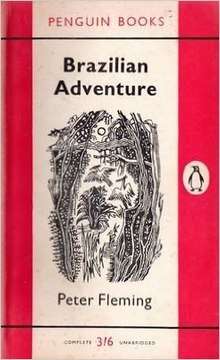Brazilian Adventure
Brazilian Adventure is a book by Peter Fleming about his search for the lost Colonel Percy Fawcett in the Brazilian jungle.[1] The book was initially published in 1933 by Alden Press.
 | |
| Author | Peter Fleming |
|---|---|
| Country | United Kingdom |
| Language | English |
| Subject | Travel |
| Genre | Non-fiction |
| Publisher | Alden Press |
Publication date | 1933 |
| Media type | Print (Hardback) |
| Followed by | One's Company |
Overview
In 1925, British explorer Colonel Percy Fawcett, along with his son and another companion, disappeared while searching in Brazil for the Lost City of Z. Not long after, Peter Fleming, who was literary editor for London's The Times, answered a small ad seeking volunteers for an expedition to find out what had happened to them. Fleming's story of that 1932 expedition is told in Brazilian Adventure.[2]
Despite a great deal of fanfare, the expedition seems to have been very poorly organized. Fleming and his companions do not seem to have done much preparation, not even bothering to learn any Portuguese. They left everything up to the leader they hired, an eccentric American, Major George Lewy Pingle, who lived in Brazil. They sailed from England, met Pingle, and followed him to the Araguaya river and down it, with Fleming, an admirer of Hemingway, blasting away at the wildlife "for sport" as they went.
When the expedition reached the Tapirapé River, which Fawcett was known to have traveled, the group fell apart. Major Pingle, whose bizarre moments of unreason had been making things more and more difficult all along, claimed the search was impossible and he was giving it up. Some of the members of the expedition agreed with him. Fleming and two others, however, decided to continue on their own and left to go up the Tapirape with their bearers. Traveling through the tropical jungle was very difficult, and, at the last, only Fleming and Roger, his former school fag [younger student semi-servant], could keep going. When they spotted natives in the distance who were said to be cannibals, they turned back. They were still uncertain about the fate of Fawcett, but they had turned up more clues than they started with.
Returning to the mouth of the Tapirape and heading back up the Araguaya, Fleming and his group found Major Pingle and the others. Fleming desperately wanted to be the first to get back to civilization with his version of why they had split, because Pingle was trying to get his own version, which was harshly critical of Fleming, to arrive first. So the two groups furiously raced each other down the long Tocantins and Amazon rivers to the port city of Para, where they could report back to England and catch a ship for home.
The book is a light but interesting read, with colorful descriptions of the landscape and its inhabitants. Fleming is very much a product of his time and class, however, exulting in the notion that he is going where "no one has ever been before," ignoring the fact that the natives have been living there for many thousands of years. The book's claim to fame is that, as the author puts it, it is "honest," completely factual. It challenges prior works of travel literature that exaggerate the dangers of the wild and the heroics of the explorers, such as the over-the-top descriptions of daring-do found in Colonel Fawcett's own writings. But the modern reader may wonder whether Fleming does not himself sometimes distort the facts, especially those concerning his difficult but not oddly danger-free last trek into the unknown with Roger. The reader may also wonder how seriously Fleming himself took the search for Fawcett, though he is clearly committed to showing great effort because his employer is paying for him to do it. His reportage was not much questioned in its day, however, and the book is still considered something of a classic in travel literature, along with Fleming's later two books, One's Company: A Journey to China in 1933 (published in 1934) and News from Tartary: A Journey from Peking to Kashmir (1936), both of which were widely read by the public and were influential with other travel writers.
Expedition members
Robert Churchward (organiser), Captain John G. Holman (aka Major George Lewy Pingle), Peter Fleming, Roger Pettiward, Neville Priestley, Noel Skeffington-Smyth, Walter Blunt-Mackenzie, Arthur Humphries*
(*Humphries was Churchward's father's chauffeur who was taken along more as a mechanic than an explorer: Churchward's father also sailed with the expedition to Brazil but didn't enter the jungle).
About author
Peter Fleming was the brother of Ian Fleming, author of the James Bond thriller series.
Bibliography
- Fleming, P. (1933) Brazilian Adventure Oxford, Alden Press
- Reprinted Northwestern University Press 1999 ISBN 9780810160651.
See also
- The Lost City of Z: A Tale of Deadly Obsession in the Amazon, a 2009 book by American author David Grann.
References
- "Peter Fleming Saves Me from Cabin Fever". oldscrolls.wordpress.com. Retrieved 11 December 2015.
- "BRAZILIAN ADVENTURE. Fleming, [Robert] Peter [1907 - 1971]". tavbooks.com. Archived from the original on 22 December 2015. Retrieved 11 December 2015.